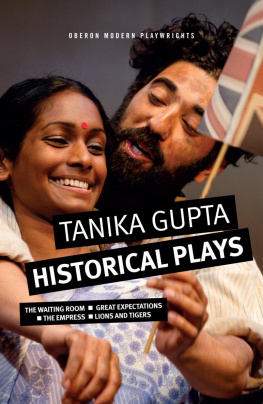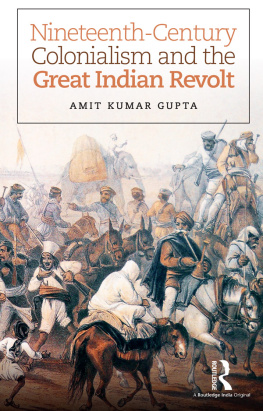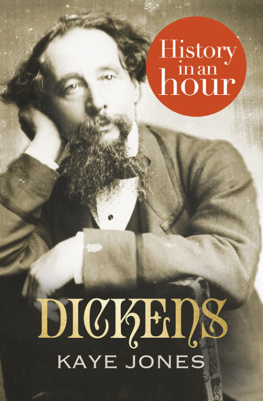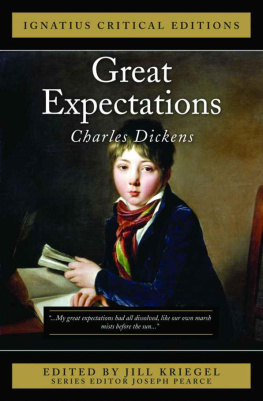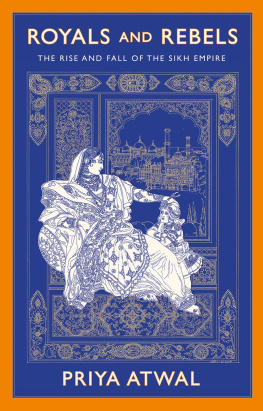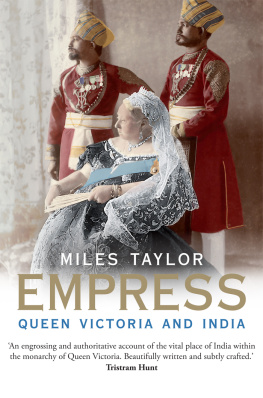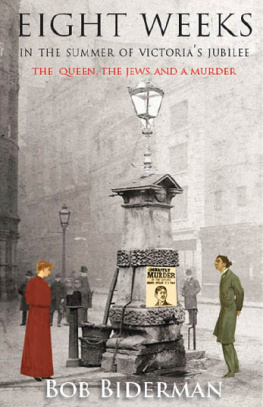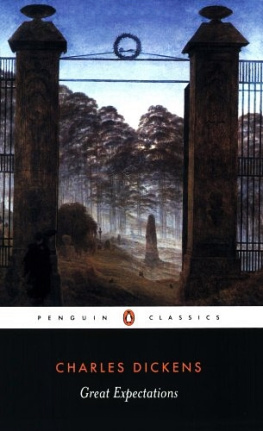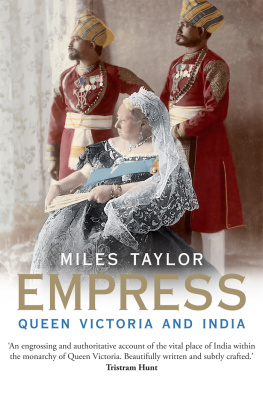This collection of plays is dedicated to my mother, the late Gairika Gupta (1942-2018). She was a role model and my biggest supporter. Her amazing adventures in life, her journey from India to the UK and her personal and political history are peppered throughout all of these plays.

This collection first published in 2019 by Oberon Books Ltd
521 Caledonian Road, London N7 9RH
Tel: +44 (0) 20 7607 3637 / Fax: +44 (0) 20 7607 3629
e-mail:
www.oberonbooks.com
The Waiting Room copyright Tanika Gupta, 2000; Great Expectation s copyright Tanika Gupta, 2011; The Empress copyright Tanika Gupta, 2013; Lions and Tigers copyright Tanika Gupta, 2017
Introduction copyright Nesta Jones, 2018
Tanika Gupta is hereby identified as author of these plays in accordance with section 77 of the Copyright, Designs and Patents Act 1988. The author has asserted her moral rights.
All rights whatsoever in this play are strictly reserved and application for performance etc. should be made before commencement of rehearsal to Alan Brodie Representation, Paddock Suite, The Courtyard, 55 Charterhouse Street, London EC1M 6HA. No performance may be given unless a licence has been obtained, and no alterations may be made in the title or the text of the play without the authors prior written consent.
You may not copy, store, distribute, transmit, reproduce or otherwise make available this publication (or any part of it) in any form, or binding or by any means (print, electronic, digital, optical, mechanical, photocopying, recording or otherwise), without the prior written permission of the publisher. Any person who does any unauthorized act in relation to this publication may be liable to criminal prosecution and civil claims for damages.
A catalogue record for this book is available from the British Library.
PB ISBN: 9781786825452
E ISBN: 9781786825469
Cover photo by Ray Panthaki and Anneika Rose, taken by Steve Tanner RSC
Printed and bound by 4EDGE Limited, Hockley, Essex, UK.
eBook conversion by Lapiz Digital Services, India.
Visit www.oberonbooks.com to read more about all our books and to buy them. You will also find features, author interviews and news of any author events, and you can sign up for e-newsletters so that youre always first to hear about our new releases.
Printed on FSC accredited paper
10 9 8 7 6 5 4 3 2 1
Introduction
T he first volume of collected works by Tanika Gupta was entitled Political Plays. In his introduction to that volume Aleks Sierz refers to the sheer variety of the subject matter of Guptas political writing. As an eminent commentator on British contemporary playwriting Sierz notes that Guptas brand of political theatre not only uses new gestures that go well beyond the ones of traditional British theatre, it also challenges audiences to see behind the story and to think about the political choices being posited on stage. The selection of history plays in this collection are also intensely political, but the precise historical contexts, the sources drawn from Guptas heritage, and the stories that emerged from her own family history add further scope, depth and complexity to the work that is not only provocative and challenging, but also enriching and rewarding.
Gupta was born in London a year after her parents arrived from Calcutta. Her mother was an Indian classically trained dancer and her father a singer and storyteller who worked as a producer and contributor to the BBC World Service. Naturally, both parents were knowledgeable about Bengali arts, especially the work of Rabindranath Tagore, poet, musician and artist, and the first non-European to win the Nobel Prize for Literature in 1913. Gupta acknowledges that Tagore inspired her early schoolgirl writings, diaries, short stories and brief plays but her mature writing moved beyond his influence. Gupta went on to read modern history at the University of Oxford where she became politicised, met her future husband on a demonstration, and afterwards worked for an Asian womens refuge in Manchester. In 1988 the couple moved to London where Gupta was a community worker in Islington, writing in her spare time, and turning to drama in the early 1990s.
In 1995 Voices on the Wind was given two performances at the National Theatre Studio. Here, Guptas Bengali background, family history, politics, and aspiration to become a full-time writer, coalesced: Voices on the Wind was one of those cathartic moments when you get handed something from your family, and you decide, This is it Im going to become a writer from now on. The narrative of Voices on the Wind re-emerges over twenty years later, expanded and powerfully told within a detailed historical framework, as Lions and Tigers. This and the other three plays collected here all have British and/or Indian settings which explore the immediate and lasting effects of Britains imperial and colonial past on both countries. Of course, as with all historical material, the audience is gifted with the perspective of hindsight.
The Waiting Room was written while Gupta was on a placement at the National Theatre Studio. The haunting images recalled by her father in a vivid dream days before he died inspired the plays narrative: he was up in heaven acting in a Tagore play but he could see me and my brother down on earth and he decided that he just wanted to come and talk to us. But he had to crawl through this long tunnel. And when he got to the end he was standing outside our house and he saw my mother and my brother coming out, and he waved, and he clapped his hands at them and they didnt see him, they just ignored him, and he realized that in his dream he was dead.
The play is set in 2000. The lounge of a suburban house provides the location for a British Indian family drama where revelations of long-held secrets are precipitated by the death of the matriarchal Priya who is granted three days to face and make amends for the mistakes and failures of her life, before entering The Waiting Room, a place where atoned spirits reside before rebirth. This ingenious idea enables Gupta to explore a variety of past and present conflicts and consequences of familial relationships marital, sibling and inter-generational while providing insights into aspects of atavistic Hindu beliefs and rituals surrounding death and the afterlife, as well as those of Buddhism and Jainism, in the wider historical context of immigration in the 1960s and the effects of assimilation thereafter. Gupta introduces other aspects of Indian popular culture by portraying Priyas spiritual guide in the guise of Dilip Kumar, a method actor and Bollywood star of the 1950s whose presence contributes to much of the plays wry humour. An offstage chorus of relatives and friends are functionaries in establishing the sounds and sights of the ceremonies that precede and accompany Priyas funeral and bring some kind of spiritual awakening to the family.
Priya is portrayed as an intelligent but unfulfilled woman who has supressed her own undoubted potential to support her academically successful husband. Their children appear to have little empathy with their parents Bengali background and culture and have experienced the opportunities of life in Britain from entirely different perspectives. Gupta accomplishes a mix of dramatic styles to depict the real world of the bemused, bereaved survivors in grief, which overlaps with the mystical space occupied by Dilip and Priya of dreams, nightmares, ghostly manifestations and heightened emotions. Between these two planes of existence Priya negotiates her necessarily painful journey of shared memories, unexpected discoveries, mutual resentments and uncomfortable truths, leading eventually to reconciliation and harmony. When she finally finds freedom through acceptance, Dilip celebrates with her in song and dance, in true Hindi film style. The magical place that Priya delightedly describes as she walks, bathed in bright light, towards The Waiting Room is brilliantly undercut by Dilips realisation of the next persona he is to inhabit. This abrupt shift back to reality is followed by the stage light fading on Priyas photograph, which has remained illuminated throughout the play.

